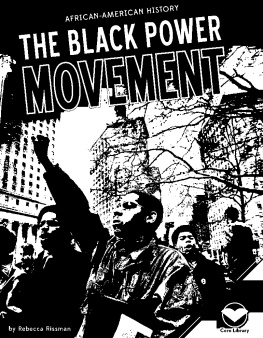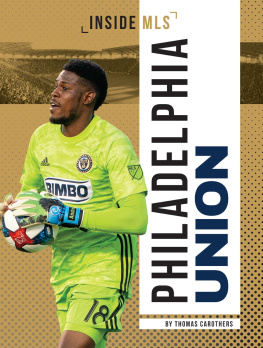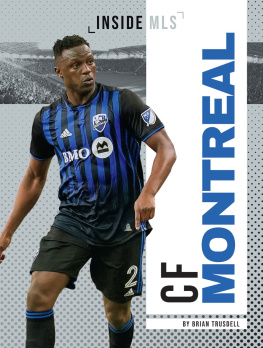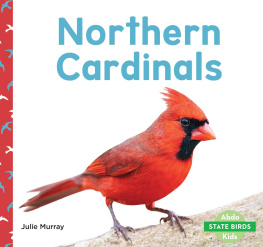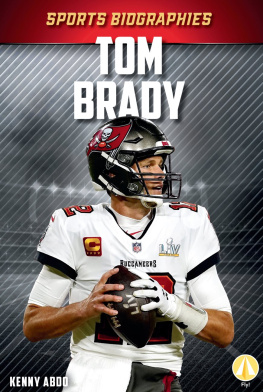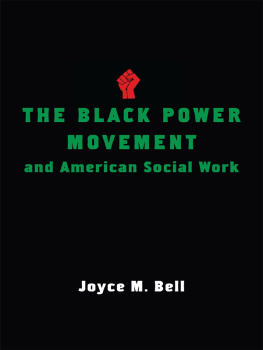Published by Abdo Publishing, a division of ABDO, PO Box 398166, Minneapolis, Minnesota 55439. Copyright 2015 by Abdo Consulting Group, Inc. International copyrights reserved in all countries. No part of this book may be reproduced in any form without written permission from the publisher. Core Library is a trademark and logo of Abdo Publishing.
Printed in the United States of America,
North Mankato, Minnesota
022014
092014
Editor: Holly Saari
Series Designer: Becky Daum
Library of Congress Cataloging-in-Publication Data Rissman, Rebecca.
The Black Power movement / by Rebecca Rissman ; content consultant, Ibram H. Rogers, PhD, Assistant Professor, Africana Studies Department, University at Albany, SUNY.
pages cm. -- (African-American history)
ISBN 978-1-62403-144-1
1. Black power--United States--Juvenile literature. 2. Black Panther Party--Juvenile literature. 3. African Americans--Civil rights--History--20th century--Juvenile literature. 4. Civil rights movements--United States--History--20th century--Juvenile literature. I. Title.
E185.615.R5217 2015 323.1196'07309046--dc23
2014000104
CONTENTS
CHAPTER ONE
|J?egfAffl| DEMAND lt THE RIGHTS erf EVERYMAN
RE]
fzSB
13 America 1 \ CENTURA
DEBT
ST!
CONTRACTt
tmemm
CHAPTER one
AFTER THE CIVIL RIGHTS MOVEMENT
The civil rights movement in the United States occurred between 1954 and 1965. It was a time when people fought hard to earn rights for African Americans. The movement led to the Civil Rights Act of 1964 and the Voting Rights Act of 1965. Before then segregation and discrimination against African Americans was common in the South. The two acts made discrimination based on race against the
law. They also made segregation against the law. But equality for African Americans was still a long way off.
Poverty and Violence Remain
Even with the new laws, negative stereotypes about African Americans made it hard for them to get fair treatment from some whites. African-American schools had fewer resources than white schools. Landlords would rent to African Americans only in rundown neighborhoods. African Americans were often kept from good paying jobs. This meant many African Americans lived in poverty.
Violence against African Americans was also a problem, especially in the South. Whites often went unpunished if they committed crimes against African Americans. Lynchings of African Americans happened often. Lynchings occurred when a mob of people publicly hung a person. Sometimes African Americans were lynched without committing a crime. African Americans sometimes faced violence and harassment by police too.
A New Movement
The civil rights movement had focused on nonviolent resistance. Its goal was to convince Americans to believe in equality of all people. Martin Luther King Jr. was a leader in the movement. He believed in peaceful protests. He thought they were the best
way to get Americans to listen to the messages of the movement.
Some African Americans grew frustrated with this though. They wanted more from the movement.
African Americans were still being treated unfairly in the United States. Violence against African Americans was not taken seriously by law enforcement.
In 1965 the black power movement began. It wanted African Americans to gain more power in their communities. Members wanted to force Americans to accept equality. They also wanted to show the unfair treatment African Americans faced. Members of the black power movement held rallies and marches.
They also gave speeches. The black power movement used strong and forceful language to make their message heard.
Malcolm X
Malcolm X was a famous African-American activist. He believed in the goals of the black power movement. Malcolm X was upset by the violent crimes committed against African Americans. He knew from history that changes in society often occurred with violence. Because of this he told African Americans they should achieve freedom and power "by any means
necessary." This included violence. He told his followers they did not need a peaceful revolution.
Black Power Movement Grows
Martin Luther King Jr. disagreed. He thought peaceful protests were best. The differences between these
two leaders showed the shift that was taking place in the United States.
Many African Americans wanted more from the civil rights movement. They supported the forceful message of black power more than peaceful protests. In 1965 Malcolm X was shot and killed. His murder made him an icon in the black power movement.
It helped the movement grow stronger.
Changing
Nonviolent
Message
The Student Nonviolent Coordinating Committee (SNCC) was founded in 1960. It started as a nonviolent civil rights organization for African-American and white activists. By 1965 SNCC changed its message of nonviolence. It also no longer preached the integration of races. It encouraged African Americans to do what was needed to gain political and economic power in their communities. This meant selfdefense if necessary. SNCC also changed its membership rules that year. Now only African Americans could be members.
rHAPTER TWO
A TIME FOR ACTION
Stokely Carmichael became a well-known activist during the civil rights movement. By 1966 he was upset by how slowly change occurred for African Americans. Carmichael gave an angry speech after an African-American man was shot and killed. He said African Americans needed to take over their own communities. He said, "What we gonna start saying now is black power!"
The Meaning of Black Power
For Carmichael the phrase black power was a call for African Americans to unite. It stood for working together to improve their communities. It meant taking pride in their culture. The most important message of black power was for African Americans to gain economic, political, and cultural control of their
communities. They also needed to demand fair and equal treatment.
Against Black Power
Some people responded to black power with fear or distrust. The National Association for the
Advancement of Colored People (NAACP) did not think people who supported civil rights and integration could support black power. The NAACP
believed the black power movement was against these things. It thought the movement might lead to a feeling of African-American supremacy. This would be just as bad as white supremacy. Many white people feared black power was a war cry for violence against whites.
NAACP
The NAACP was founded in 1909. Its goal was to end discrimination and violence against African Americans. It wanted to make sure African Americans had the rights given to them in the US Constitution. Martin Luther King Jr. often worked with the NAACP. The NAACP believed in the nonviolent methods of the civil rights movement.
Black Panthers
In October 1966, Huey Newton and Bobby Seale founded the Black Panther Party for Self-Defense in Oakland, California. This group believed in socialism. This is a system of governing that is controlled and led by the community rather than a set of individuals.
Kwanzaa Created
Maulana Karenga founded US Organization in 1965. In 1966 he created Kwanzaa.
The holiday celebrates African heritage through song, dance, food, and togetherness.
It lasts seven nights. Each night a candle is lit on the kinara, or candleholder. This stands for one of the seven ideals of Kwanzaa. They are unity, self-determination, working together, cooperative economics, purpose, creativity, and faith.
Next page
